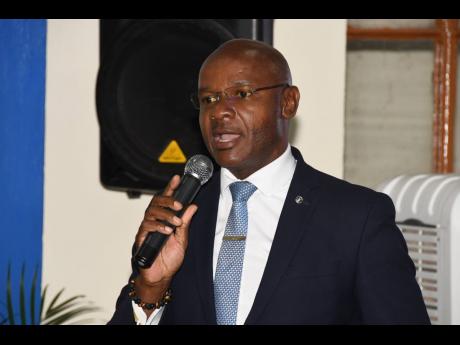Growth & Jobs | Let Beryl be the tipping point for individual action on climate resilience – Claudine Allen
WITH RECOVERY efforts under way in Jamaica to return life to a sense of normality in parishes and communities severely affected by Hurricane Beryl, Claudine Allen, member ombudsman for the JN Group and general manager of the JN Foundation, has urged citizens to use the early start to the hurricane season as their tipping point to take personal action to improve their own resilience to the impact of climate change.
Hurricane Beryl, which battered sections of Jamaica as a Category 4 storm, made history on multiple fronts, becoming the strongest Atlantic hurricane on record in June or July, and the earliest Category 5 storm on record. It became a Category 5 hurricane on July 1.
Reports suggest that climate-related hazards will only get more intense as climate change accelerates, and as Jamaica and other small island developing states remain vulnerable to the risks. Allen said each family should prioritise taking decisive steps to prepare for more extreme weather events to complement the efforts being made by government and businesses.
“While most of the households across the island would have been spared significant damage, some families lost everything. We pray for their smooth recovery,” she said, adding that “even as national recovery efforts unfold, our collective recovery as a nation hinges heavily on our individual action”.
She asserted that Hurricane Beryl ought to be a turning point for people to look to alternative energy solutions for their households.
“Let this be the tipping point for us doing even small things, such as getting light bulbs that do not require electricity,” she said.
Allen said taking individual steps to mitigate the effects of climate change in the home will help to improve the country’s resilience.
“While we may not readily make the connection, Hurricane Beryl and other natural disasters are the result of rapacious commercial activity, as well as individual inaction. Your own decision not to recycle, to compost, harvest rain and grey water; your own decision not to use low-flow faucets … all that inaction creates climate disasters such as Hurricane Beryl,” she suggested.
She said that over time, resilience can be improved by changing everyday habits, and urged citizens to consider the experiences of others in times of crises.
“Everyone has a role to play in the fight against climate change, and our country’s resilience to its effects will depend on how thoughtful we are as neighbours, friends and responsible citizens. There are many ways for us to improve our own resilience and reduce our own carbon footprint, but there are also ways to work together, and we should be encouraging others to get involved to make a difference,” she shared.
Michael Powell, head of security at JN Bank, also urged Jamaicans to be aware of the linkages between climate change and security.
According to the UN environment programme, in recent years the linkages between climate change and security have gained significant attention, with there being several security concerns, including impacts on food, water and energy supplies; increased competition over natural resources’ loss of livelihoods; forced migration and displacement.
In the wake of Hurricane Beryl, for instance, the Government of Jamaica had to take actions to prevent price gouging (the charging of high prices on critical commodities). An order was issued under the Trade Act to regulate prices and ensure fair access to necessary supplies, protecting citizens from exploitation.
Prior to the arrival of the hurricane, a nationwide curfew was also implemented, requiring citizens to stay indoors for their safety.
Zoning in on physical security, Powell said: “We must recognise that these events can affect our safety. Always abide by orders given to evacuate, move to higher ground or stay put. Your disobedience may cost you your life,” he said.
Powell said that very often, the aftermath of natural disasters, such as hurricanes, also attract unscrupulous people seeking to profit from people’s misfortunes. He said one should always be cautious about who they interact with it.
“Try to invest in renewable lighting, at the very least. This is not just for your ability to see and navigate in the event of a power outage, but criminals prefer to conduct their illicit activities under the cover of darkness,” he shared.
“Be wary of fake sales and people offering you temporary jobs after a disaster. If you have to spend money to make money, it’s likely to be a scam. Also, if you are planning to donate to a recovery effort, be sure to do your due diligence, because you may just be giving it to fraudsters pretending to be from a charitable organisation,” he added.


